#value of human conscience
Quote
Neither the senate nor the people can give us any dispensation for not obeying the universal law of justice. It needs no other expositor and interpreter than our own conscience.
Cicero, De Re Publica
74 notes
·
View notes
Text
Is Religion the Moral Compass?
Is religion necessary for morality? Let's dive into this complex question and explore the different perspectives. #religion #morality #ethics #faith #secularism #fierceempowerment #fiercemillennial
Navigating the Complex Relationship Between Faith and Morality
The age-old debate of whether religion is essential for morality has sparked countless discussions and philosophical ponderings. Some argue that religious beliefs provide a solid foundation for ethical behavior, while others contend that morality can be derived from other sources, such as human reason, empathy, and cultural values.…
#conscience#ethics#faith#FIERCE EMPOWERMENT#FIERCE MILLENNIAL#humanism#morality#philosophy#religion#secularism#spirituality#values
1 note
·
View note
Text
i have seen several posts around that addressed how discouraging gale from taking the crown of karsus is “keeping him from realizing his true potential.” that tara is merely upset at his choice, instead of being utterly devastated at the loss of her little love. that it’s not a bad ending per se because to get there he didn’t need to sacrifice 7000 innocent souls in the process. gale isn’t continuing the cycle of abuse either, he still appears to love tav and does come back for them to offer them ascension. he wants them to be equal, so it can’t possibly be an unhealthy dynamic, right?
but what of gale himself, his own convictions, values, and everything he holds dear? everything flawed and human that shaped him into the person he is?

player: are you saying you want to ascend? claim godhood?
gale: no, not like that. i don't want to join them. i want to better them. a god's powers, paired with a mortal conscience, a mortal heart.
gale’s motivation for acquiring godhood is that he will able to aid mortals in a way no other god has ever done before. he won’t hide behind pretense nor require blind devotion of his followers. he will understand and be able to empathize. he wholeheartedly believes that he will be different - he will act.

gale: [..] the gods could aid us if they wished, but instead they cower behind ao. so let us act ourselves.
gale believes that by becoming a god he will kill two birds with one stone: aid mortals and acquire enough power to quash any of his insecurities and enemies in the process. that by ridding himself of every perceived flaw he'll finally feel like he will have enough to offer - maybe, just maybe he'll even be content. his flaws are merely holding him back from becoming the best version of himself, and by ridding himself of everything fallible, he will be whole. maybe this is what all of his suffering has led up to. maybe the orb chose him. maybe the reason he had to endure all the pain, isolation, and excruciating loneliness was so that he could realize that he was meant for something even greater. after all, power feeds ambition. and what is more powerful than a god? his convictions were certainly naive, he possesses enough knowledge to know better. don't get me wrong, part of him definitely wants to spite mystra a lil. but his intentions at that time were mostly pure. a reflection of his self-hatred and feelings of inadequacy.

player: this is wrong, gale. that power will corrupt you, even if you can seize it.
gale: it won't, i swear to you. it's merely a tool - a means to an end.
once we meet gale at the party in his new godlike form, it is apparent that even with all the power at his fingertips, he has reached no greater knowledge about himself. his insecurities are still as present as before, he merely is less subtle in his compensation - repeatedly highlighting his grandeur and how dull life on faerun is compared to the wonders of elysium. it is also genuinely crushing to see how little he thinks of himself even now.

gale: i was nothing. a drifting dust mote of a wizard, abandoned by my goddess, my powers lost, my reputation destroyed. and look at me now. i'm their proof.
any perceived dismissal of his Greatness™ is met with immediate disdain.

gale: a bold decision to treat a divine being with such cold indifference.
nodecontext: aloof, annoyed you weren't impressed with him

gale: you mortals do love to live dangerously, don't you?
nodecontext: the slightest hint of a threat - you've probably made an enemy here today. or at least, you've lost a friend.
he is still desperate to impress. emphasizing what an honor it is that a new-born god chose to bless their little soiree with his presence. gaze upon all his divine glory! gale has now become the embodiment of everything he criticized about the gods. his original intentions and plans are discarded and long forgotten. he assuages his erstwhile companions by telling them to simply pray to him, in case they should ever require aid. if they're lucky and their ambition pleases him, he might even deliver.

player: what does the 'god of ambition' offer to his followers?
gale: i 'offer' them nothing. i inspire them to seize their destinies for themselves.

player: interesting, so you help mortals help themselves?
gale: precisely. though that isn't to say i'm averse to the odd bit of direct encouragement.

gale: [..] my aims are set a little higher than offering cursory blessings to just any half-decent spellcaster.

gale: regardless, ethical quandaries are more the remit of my mortal devotees. they do love to talk, and faerun is starting to listen.
aiding "any half-decent spellcaster" is unbefitting of his status. he isn't concerned with questions of ethics and morality either. deeming such matters beneath his divine capabilities.
once gale has ascended and established his domain, what remains of the gale we knew? what of his mortal heart?

minthara: your ambition is not cruel, but you fear that if you indulge it, you will lose yourself in the mysteries of the weave and unravel the world.
minthara: you are afraid of so many things, and it is that fear that keeps you true to yourself.
gale did lose himself and ultimately became one of his biggest fears. considering that his existence as a being of pure ambition leads him to constantly seek out greater heights, it isn't farfetched to believe that raphael's prediction will indeed come true.

player[astarion]: ambition? finally, a god i can get behind...
gale: i assure you, this is merely the prelude to a far grander vision. elysium's in for something of a shake-up.
all that remains of gale is a thin veneer of the person he used to be. what he presents is a hollow echo of the old gale. he does retain some of his mannerisms and quirks, but he is definitely a lot colder and more condescending. if his personality already changed that drastically after a duration of only 6 months, what will he inevitability turn into when he has eternity at his disposal?
essentially, you are aiding gale in the eradication of himself. eradicating everything about him that made him into the loveable, charismatic, awkward, kind, buoyant person he was. everything about him that he perceived as defective, flawed, and lesser-than. before, his hubris was merely an expression of his own discontentment and low self-worth, but now he is hubris incarnate. all of his worst qualities have been amplified.

gale: i am ambition incarnate. as indistinguishable from that most potent sensation as mystra herself is from the weave. and word is spreading.
nodecontext: palpable, almost unsettling excitement from him - hint of megalomania
he put his trust in tav, trusting their judgment and relying on them to nudge him in the right direction. after all, they had plenty of opportunities to show him that they are an ally worth following and confiding in. but in the end, the prospect of what he could be, the things he could give them, the enemies he could yet conquer, won over the desire to simply accept him and help him rebuild a life on solid ground. tav denied him the unconditional love he craves most out of their own selfish desires.

tara: you were looking out for him. i expected better of you.
as i've already mentioned, gale desires nothing more than to be seen, accepted, loved, and valued. having a partner who wholeheartedly supports and believes in him is enough to make him feel content. most importantly - he just wants to live. to enjoy life with everything it has to offer. his ambition can’t be quenched because he hungers still. believing that only by acquiring more power will he finally be enough and reach said acceptance.
we see in his good ending that his own contentment was even able to influence and (temporarily) sate the orb's ever-present hunger:

gale: [..] or perhaps the orb's hunger was fuelled by my own, and my contentment influences it in much the same way.
gale: that's how i feel with you - content. it's a rather unfamiliar feeling, i must say. not something gale of waterdeep ever craved.
it is devastating that he doesn't reach the same feeling of fulfillment if he chooses to pursue godhood, and is instead compelled to continuously surpass his own accomplishments. not being granted rest or reprieve.

gale: i achieved everything we hoped i would, and still i'm not good enough for you?
gale pursuing godhood isn't evidence that he "has been evil all along" or that he "just waited to be unleashed" either. we can't diminish tav's influence in this outcome, they are after all an extension of the player. able to steer every companion toward a path of redemption or to enable them in their worst traits. fandom has already established that by letting astarion ascend you are actively supporting him in becoming the very thing he despises most, putting your own ambitions and idea of what you want him to be above his healing, this is no different.

tara: the gale i knew wasn't like this. he recognised his mistakes. he was contrite. all he wanted to do was live.
tara: unfortunately, he fell into company that turned his gaze towards foolishness. yes, i mean you.

player: gale is his own man, tara.
tara: false. he was mine. though now he belongs only to his own pride.
yes, the epilogue cutscene is beautiful and there is something bittersweet and romantic about his love for tav being one of the few emotions that remained a constant throughout the past 6 months. he didn't need to come back for them, but he did cause he loves them still. no matter how warped his definition of love may be now. while it is abundantly clear that tav ranks lower on his priority list than they did before, his commitment remains.
gale fears isolation, hoping to never return to the time when he was hopeless and alone, stuck inside his tower. by heading in this direction he is once again creating a self-fulfilling prophecy.

tara: [..] if i pretended you hadn't turned tail on every lesson you set out to learn, i'd have no right to call myself your friend.
morena may as well have already resigned herself to her son’s death. elminster partly blames himself. for his lapse in judgment, as well as being the one who plucked him from obscurity in the first place. mourning the kind, bright-eyed boy who cried at the scorched roses in his neighbor's garden. tara won't be here anymore to care and look out for him either. he has lost his oldest and dearest friend, the one who witnessed his downfall from grace and never left his side. who believed him to be the finest mind AND the finest wizard she's ever had the pleasure to know. who was certain that he’d find a way out of any crisis no matter the circumstances. ...and if tav declines his offer to ascend with him? what does he have left?

gale: yes, i am rather radiant, aren't i?
tara: don't flatter yourself, gale. you've debased yourself in ways i could never have fathomed.

tara: goodbye gale, i hope the heavens are worth it.
gale’s godhood ending deals with the loss of humanity, the loss of oneself, and everything one holds dear. it is a devastating and bone-chilling narrative. it is a tragedy.

gale: i hope you don't think less of me. great ambition should not come at the expense of what you already hold dear. i see that now.
if gale could see himself, he would be horrified at the losses he deemed necessary to get here. he would be horrified at what he’s become.
#buckle in this is gonna be a long one!#even for my standards#to be clear this is by no means meant as a slight against specific users#just here to clarify that it is definitely one of the worst outcomes for gale#gale dekarios#gale of waterdeep#baldurs gate 3#bg3#bg3 epilogue#bg3 epilogue spoilers#bg3 patch 5#bg3 meta#god!gale#had this sitting in my drafts for days now but i am so sleep-deprived that i can't even tell if this is cohesive anymore (i apologize)
1K notes
·
View notes
Text
The beginning of the Decepticons according to Megatron:


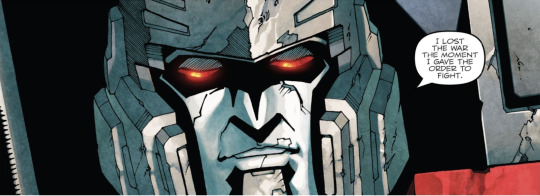
The beginning of the Decepticons What Actually Happened:

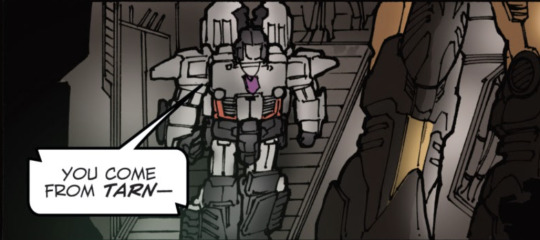
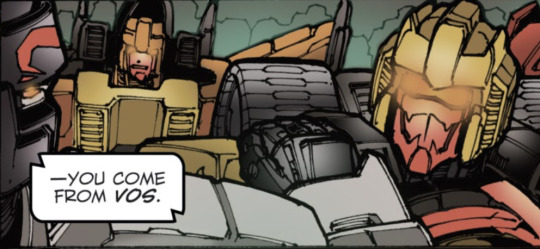
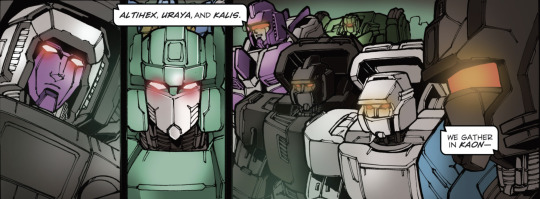


That it could ever be called a revolution of the oppressed is a joke. Megatron's philosophy is purely pugno ergo sum. I fight, therefore I am. His first recruitment speech was a promise for power, made to the most bloodthirsty audience he could dig up from the dregs of society. Those people were there because they thrived off the bloodsport. They wanted audition to join Megatron in the pits. Megatron offered them something even better: turn the entire planet into our gladiatorial arena, and we take.
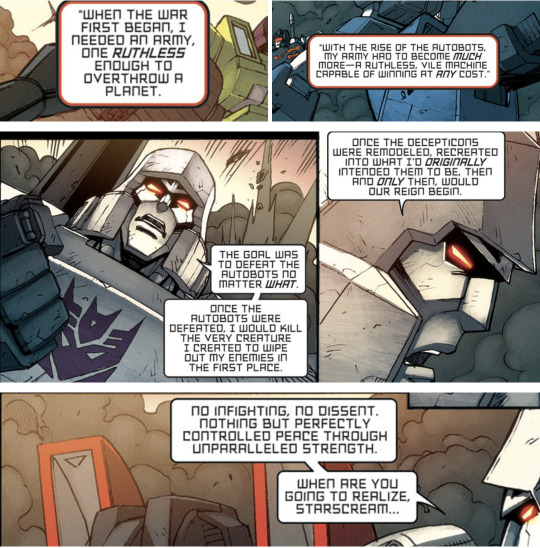
Ever since the beginning Megatron viewed the Decepticons as nothing but a tool, to be used and thrown away. He wanted them to be as ruthless as possible in order to wipe out all opposition, but once his end goal's achieved, well, there's no place for ruthlessness in a perfect society under his absolute control. Therefore, remodelling and recreating. It doesn't sound like he wants to rule over actual people with individual personalities, he wants a bunch of mindless drones programmed for obeisance and peace and hardcoded to Do What Megatron Says.
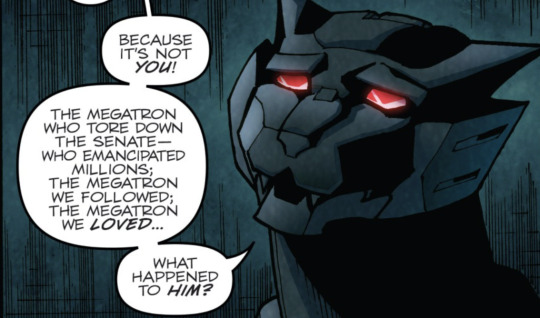
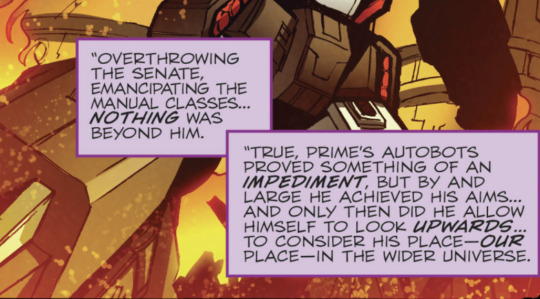
Ravage and Tarn. It's interesting how they both use the word "emancipated" when lauding Megatron's accomplishments, when it's clear that Megatron did so for the practical purpose of bulking up his army. He overthrew those in power because he wanted to be the one in power. The only one. The people he "emancipated" were just exchanging one set of shackles for another, as they had no choice other than to join the Decepticon army. Not fighting was not an option. Cowardice was punishable by traitor's wheel. Going neutral was also not an option. Soundwave had specific anti-neutral pogroms for those.
I wonder if they knew what "the Megatron they loved" had in mind for the Decepticons after they won the war. The remodeling and recreating. Or maybe they thought that's just for the lowly genericons. That they would be exempt from such treatment because they were confident of their privileged places at Megatron's side. After all, if you're rooting for someone whose motto is peace through tyranny, you'd do so with the expectation that it's only Other People who are going to get tyrannized.
It's true that he did rise against an oppressive government, despite it being the goal to replace it with himself as the tyrant.

But he also thought the single admirable quality about Zeta was his ruthlessness. As in trying to kill an entire city of his own people to fuel his vamparc ribbon. And he said that in front of Hot Rod, who was forced to bomb his own city to stop Zeta from winning. Even disregarding the twisted values here, this is still fifteen levels up the insensitivity lane. No wonder Hot Rod didn't want to join up.

Torture's for fun and domination. It takes a special kind of sadistic streak. And this is before the war even officially started.
Thundercracker's view on the Decepticon cause, when he defected to save humans from the nuke:
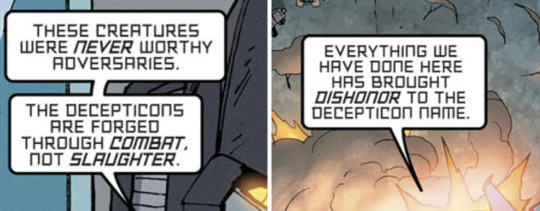
"Everything we have done here" - Just here? He'd either been living under a rock for the entirety of the war or has some serious misunderstandings about what the Decepticon name is.
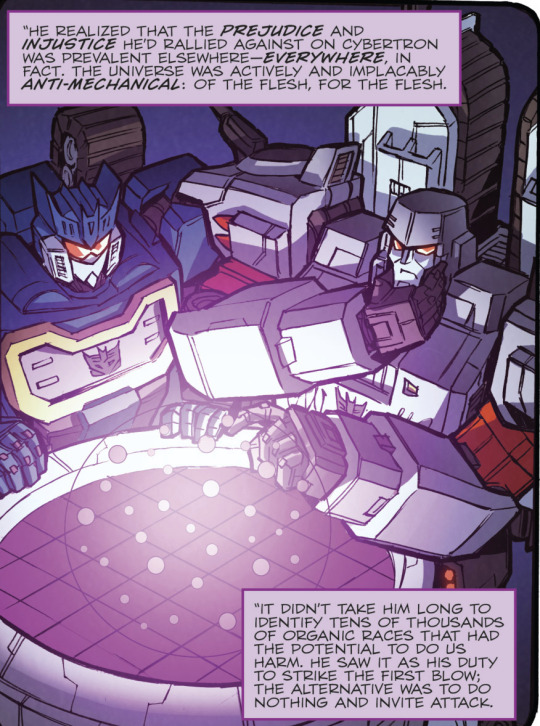
Or just been willfully blind for four million years and the deaths of a hundred billion lifeforms until the day he decided to grow a conscience. Same with Soundwave.
Tarn's a really good case study because he's the poster boy of Megatron's Decepticon propaganda. Megatron probably spoonfeeds him the stuff by the gigabytes and he regurgitates them with twice the zeal and tenfold the pretentiousness. He's also the embodiment of the vices and tragedy of the Decepticons as a whole, as created by Megatron. A sadistic hypocrite, a glorified thug, a delusional fanatic, a customized tool for use and dispose. Crippled by the blinkering desire to be superior, to be part of a greater cause.
Megatron cares nothing for Tarn, just like how he cares nothing for the Decepticons. During the war they were a means to an end. After Megatron's defection, their "toxic loyalty" became a personal burden, a blemish from his past that he would like to cast aside and move on from but annoyingly refuse to leave him alone.
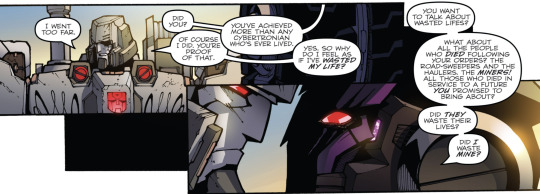
The road-sweepers and the haulers. The miners. What were they to Megatron during the war? Disposable cannon fodder. A pretty banner to hide behind. For a movement that likes to justify itself as a revolution of the oppressed, the emancipation of the disenfranchised, there's certainly a distinct lack of those classes among the upper Decepticon ranks. Megatron said in his recruitment speech that he wanted strength and power. Then where did that leave the weak and sick, the empties on the streets?
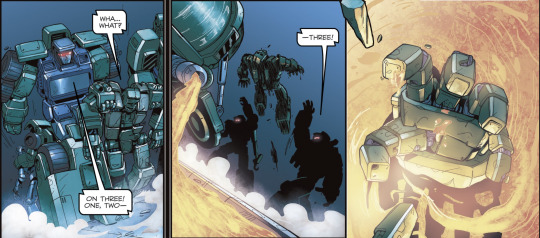
Nowhere but the smelting pool, to be recycled into something useful for the great Decepticon cause. They should be honoured, really.
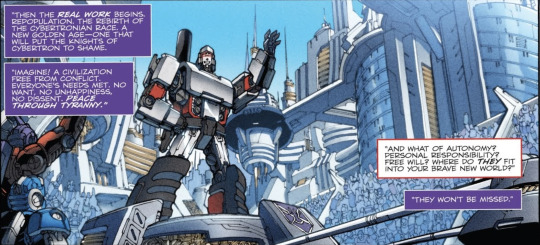
Freedom fighters? No, freedom won't be missed. Probably has something to do with the remodelling and recreating part.
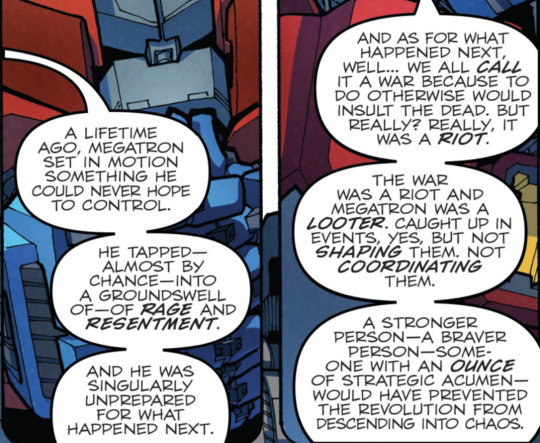
Starscream's only partially right. It was absolutely Megatron's intent to tap into that well of rage and resentment, and he meant for the riot to happen. Of course it got away from him in the end - that's what happens when you cobble an army out of bloodthirsty power-hungry degenerates, half of which were on board for the violence, half for their own scheming agendas, and the rest stitched together by charisma and fear - but he'd shaped the events enough to come a hairsbreadth away from winning multiple times. People like Shockwave and Scorponok were treacherous, but they weren't the reason that Megatron lost the war.
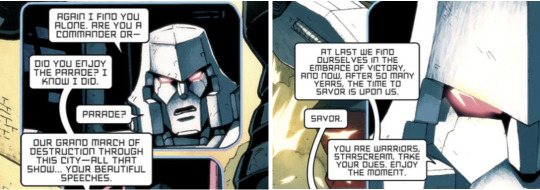
It was his own blind arrogance that led to his downfall.

No he didn't lose his way. He's exactly where he set himself out to be, from the moment he gave that speech in the arena. Perhaps even earlier, to that gradual slide when killing his opponent in a match no longer felt like a guilty burden but instead brought him the sweet rush of satisfaction. There was no revolution. There was no righteous cause. There was no for the people and never has been, because he did not care about other people. Four million years and countless deaths, and it was only really about one insanely self-centered person and his deluded ambition of peace through tyranny.
Hence his breakdown, because he'd just been hit in the face with the realization that he was Wrong. And has been wrong for the past four million years. He wasted everyone's lives. He wasted his own life, wasted it on anger and destruction and hatred, with nothing but regrets to show for it.
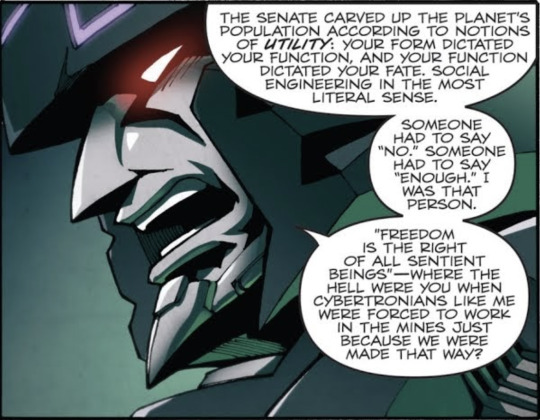
I believe that Megatron believed he's telling the truth here. I believe that he meant every word he said, except for that one "we" on the second last line.
Because that "we" should really be "me".
The Megatron who wrote about pacifist rhetoric, who was compassionate enough to share his fuel with the injured, who cared about others and had genuine friendships, that Megatron died a long time ago in the pits. Ever since then, every murder, every atrocity he'd committed in the name of "the people" was just facist rationalization.
I'm sure that he likes the sound of "emancipation of the people" or "freedom of choice" as a concept. But when it comes down to individual people? With actual, real choices that conflicts with his desire for absolute rule? Nope. He's the only one who should get to make choices. The only one who should have choices. Because he knows best.
Form dictates your function ❌; Megatron dictates your function ✅
Function dictates your fate ❌; Megatron dictates your fate ✅
Great minds must think alike, because Megatron and the Functionalist council in the Functionalist universe did a lot of the same stuff. Massacring the Senate. Recycling people who are deemed useless burdens. Remodelling and recreating. Imperalism and genociding organics. Killing all dissenters. The Functionalists even got pretty close to Megatron's ideal of peace through tyranny with 99% of the planet fitted with brain bombs and kissing the ground at their feet. They even managed to do it while maintaining a habitable planet and full population. And Megatron took one look and was disgusted.
Megatron wasn't a misunderstood revolutionist who had his heart in the right place when he started his war. The Decepticons didn't start out well-meaning and turned bad somewhere along the way. At no point in their movement were they ever true freedom fighters. They were always Facists, through and through. They were worse than the Functionalists they hated and the Senate they overthrew. And it's important to acknowledge this because (other than it's weird to see such an obvious Facist analogy being associated with freedom fighters) otherwise you don't get the whole depth of Megatron's redemption arc, especially in the Functionalist universe.
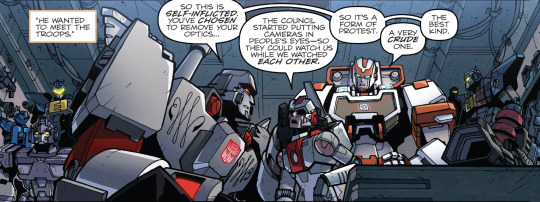
Like the impact of this scene wouldn't be fully apparant unless you take into account that when Megatron first formed the Decepticons, all he cared about was their fighting strength. He did not care about his troops, he did not care about individual people. He considered himself above everyone and everything. He would have sneered at such a weak, ineffective form of protest. Now he's actually being supportive and seeing people as people, instead of pawns to be used.

Here he's genuinely happy to see the Decepticons, even those in the very bottom of the pecking order, taking enough care to greet them each by name. And also Fulcrum, who he sentenced to death twice.

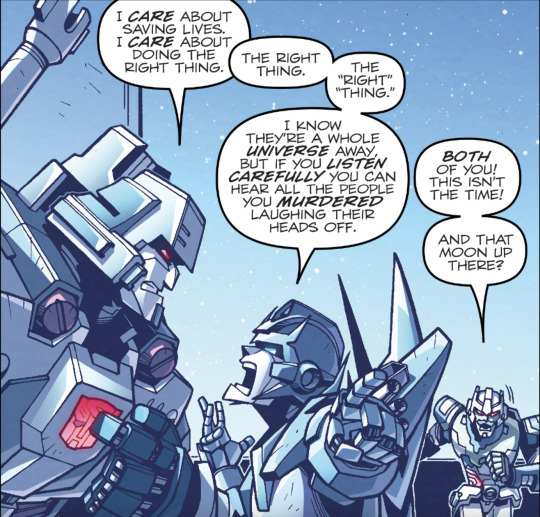
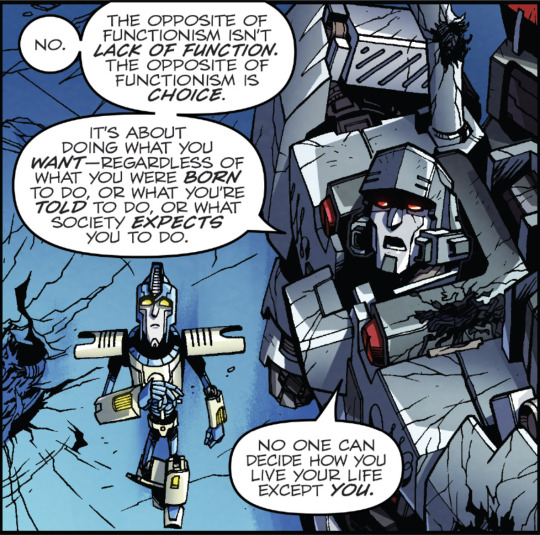
For once in his life he's actually trying to do the Right Thing instead of focusing on himself, either on his ambitions or his remorse. The people in the Functionalist universe have nothing to do with him, yet he wants to help anyway. And he's finally appreciating the value of self-determination for what it is, instead of trying to twist it to serve his own purposes or turn it into Megatron-determination.
"No one can decide how you live your life except for you." Back before, he was going to remodel his entire army to achieve his peace through tyranny. Autonomy and free will were considered things that won't be missed.


Megatron learned to care about other people! Peace through empathy is such a groundbreaking step for his character because he used to have no empathy! He stayed true to his ideals for eight centuries despite the hardships, despite his personal losses, despite the AVL being driven to near extinction and not knowing if he would ever return to his own universe. During all those years he could have had ten million chances and excuses to break his vow of pacifism or leave on the Last Light, taking the easy way out, and there would have been no one to stop him.
But he didn’t.
#transformers#idw transformers#maccadam#megatron#also he tossed his Decepticons out the back door at first chance in exchange for his freedom and legacy#the trial on Luna 2#his frowny face when reading the surrender speech wasn’t for letting the Decepticons down it was for his own humiliation
509 notes
·
View notes
Text
its nearly 3 am and i should sleep but vampire neuvillette…. ourgh…….
vampire neuvillette who is not affected by the sunlight, yet still chooses to avoid contact with it, instead gazing at the light with a faraway look from his office window.
vampire neuvillette who basks in the moonlight when in his lonesome, a sombre yet hauntingly beautiful image painted for no one to bear witness to.
vampire neuvillette who is surrounded by many, humans and melusines and other beings alike, yet appears the loneliest in spite of that, his figure stark against the bustling crowds and empty rooms.
vampire neuvillette who somehow finds himself identifying you immediately when within the same vicinity, having blocked out every face, every disturbing scent which invaded his senses, just to see you and quietly watch from afar. (because that is what he does best. he maintains his distance and keeps to himself, avoiding any further implication than what is necessary.)
vampire neuvillette who, in spite of his long-held values, finds himself drifting towards you like a moth would to a flame. it’s inexplicable how drawn he is to you — how magnetising your mere presence is to him — and yet he cannot find it within himself to hate this feeling. rather, he finds himself chasing after it, hands grasping at what little you seem to give in a desperate attempt to close the gap he worked hard to create.
vampire neuvillette who finds he doesn’t need to bask in the overbearing sun, for your smile and eyes which glimmer like starlight are all he needs in this gloomy world he’s supposed to reside in. you are kind, a feat he sees in the way you treat the melusines, how you talk with the locals and can deal with their… less than favourable actions at times, in the way you help tourists in a patient manner, and by the way you laugh in a way which implies you enjoy his presence. (the notion has him more giddy than he would like to admit.)
vampire neuvillette who jolts the first time your skins touch, hands brushing as you hand him a pile of finished paperwork, as he stares at you aghast while cradling his burning hand close to his chest. it was an odd phenomena, one he had never experienced before (he seemed to be having a lot of those in recent times), yet the vivid tingles are etched into his skin and seep into his veins in a way that has him wanting to reach out and experience such sensations with you once more.
vampire neuvillette who discovers what it means to lose control for the first time in his extensive life when you’re suddenly beneath him, neck bare amidst a messily open collared shirt and a tantalising scent permeating from your skin. it wasn’t supposed to go like this, he thinks to himself through bleary eyes and a hazy mind. had he known his stock had run out, he wouldn’t have accepted your offer for dinner, battling through his long-forgotten starvation until you found him in such an embarrassing predicament. but your words of consent repeat in his conscience like a broken record, your voice clear against his jumbled thoughts as he zeroes in on your blood. it is a scent he has grown indifferent to over the years; well, until you stumbled into his life with a warm demeanor and sweet smile, effectively thawing his once frozen heart, that is.
#genshin impact x reader#genshin x reader#neuvillette x reader#genshin impact x you#genshin x you#neuvillette x you#sophie talks concepts <3#throws up what is this man doing to me i dont hate it i love it but i have too many wips but not enough time ohno why me why him whyy yyy y#anyway gn i hope u all will be as insane abt this as i am 🫶🫶
616 notes
·
View notes
Text
Algerian President Abdelmadjid Tebboune called on the International Criminal Court (ICC) to take action to hold Israel accountable for the crimes it is committing against Palestinians in Gaza.
Tebboune expressed his concerns regarding the state of justice worldwide and the rights of oppressed peoples, with a specific mention of the Palestinian people.
He stated that in Palestine under occupation, all human, moral, religious, and legal standards and values have crumbled due to the brutal massacres carried out by the occupying forces against the Palestinian people. These atrocities are witnessed daily by the world, yet there is a terrible global silence. Additionally, there is an unjust and strict siege that violates the principles of international humanitarian law, yet the conscience of the world remains unmoved by these massacres and the siege.
Tebboune asked: “Where is humanity? And where is the global conscience that has become absent regarding the genocide being committed?”
7 Nov 23
321 notes
·
View notes
Text
I like the hidden inventory arc because it’s the only arc where horrible atrocities happen but they’re all caused by humans instead of curses.
the time vessel organization, the jujutsu higher ups, toji, the villagers who torture little children, the 3 big jujutsu families, tengen and everyone who operates in their behalf (yes, this even includes yaga) - they’re all complicit in the atrocities that geto says “everyone knows about and that are nothing out of the ordinary”.
but most sorcerers dont question these atrocities, they’re trained to focus on curses as the single source of all evil after all. and yuuji is a prime example for that (even though he is one of my faves).
he saves people indiscriminately, it doesn’t matter if said person has done horrible things to other people. he wants to save them on the single basis of them being human. but he fights mercilessly against curses, even against those who have human sentiment and feel love or comradeship for their companions.
in a world where young people are indoctrinated to fight curses as the sole source of evil, geto is the first one to halt and question “whom do I do all that for?”. he spirals, radicalizes, leaves to change the broken system from outside - but fails miserably.
however by doing so, he inspires his best friend to change the system from within - his friend who’s been so strong all his life, he didn’t see much value in the weak and relied on geto as his conscience until he saw what the system did to his precious friend.
again it’s unfortunate that the only thing this arc is popular for is the KFC breakup but whatever lol.
#this turned out longer than I thought#respect if you made it here 💀#jujutsu kaisen#jjk#geto suguru#jjk geto#jjk gojo#gojo satoru#satosugu#stsg#itadori yuuji#yuji itadori#tengen#tagging satosugu too because it’s kind of about their relationship#☁️.blogging
120 notes
·
View notes
Note
HI! I just wanted to let you know I think absolutely nobody writes about Johan Liebert better than you do!
AAA THANK YOU i've been thinking about johan lately... i recently had this long conversation with a friend about monster and man. johan really is the it girl of antagonists. it gives so many fun qualities to play around with when characterizing him as a yandere.
specifically, how he goes about keeping you from leaving. some yans use force, physical confinement, threats and manipulation, but johan doesn't really have to. you're in this position that burdens you with responsibility. it's your conscience that shackles you. johan is a person who, officially, doesn't exist. every alias he takes on has been meticulously forged. his crimes are largely carried out by others and aren't considered related. no one knows what they're contending with.
no one aside from you.
maybe you can't undo all the harm he's done, or prevent the tragedies he will enact, but you can do something. this knowledge is a pesky, trying thing. what starts as a nagging thought becomes a poltergeist that can't be exorcised. johan won't kill, maim, or significantly impair you in any meaningful way. his affection that grants this immunity makes you his achilles heel. what-ifs become the force that keep you awake at night.
what if your interference, meager as it may seem, saves one life? what if you uncover something that could finally see him brought to justice? what if by fleeing, you're inadvertently dooming those he'll raze in the future? these possibilities fester and proliferate by his goading. he tasks you with convincing him that human life is valuable. he'll quietly sit through every argument you make, granting you as much time as you want.
occasionally, he makes concessions.
if you see so much value in this person's life, then so be it, he'll leave them be. the rush of relief that comes from saving someone turns to cold dread. in your absence, he considers nothing sacred. it's your involvement that prevents everything from descending into chaos. the time you willingly spend with him would be impossible if society itself unraveled, after all. he delays his more malicious machinations just for a taste of your undivided attention.
the worst prisons are those with the doors left open.
134 notes
·
View notes
Text
The Culture in Morality: Dylan Klebold Journal Analysis, 2.
Below is a quote from Dylan's journal that stands out to me. The first part: the evidence of desperation to cleanse impurities. With this, I can garner that Dylan seems to have a deluded sense of morality. Second: It looks like he is trying to blend in with the general population. It’s not only him who thinks this way, so do other individuals. It’s as if he is trying to attain unity or solidarity from the act of “cleansing himself morally”. Moreso, attempting to be "human".

Humanity: Ethics and Morality
According to Emile Durkheim, one of the founding fathers of sociology, morality reflects the organization of society and binds it together. It serves as an agent that bridges the divide between individuals. Morality, in essence, consists of principles distinguishing between good and bad.
Charles Darwin’s "The Descent of Man, and Selection in Relation to Sex," published in 1871, asserts:
“I fully subscribe to the judgment of those writers who maintain that of all the differences between man and the lower animals the moral sense or conscience is by far the most important.”
Since then, an influx of questions has arisen regarding the relative importance of culture and biology in determining morality. Whether the moral sense is derived from either of two aspects:
the moral rules humans accept as behavioral guides (assessing right or wrong); or
the biological basis of ethics (consciousness of actions and consequences)
Ethics has an established difference from morality. It is the notion of doing a rather practical or pragmatic action, while morality is the idea of being driven to do good. An ethical code does not have to be moral to be justified, but must be feasible or convenient. This means that as long as an idea is practical, whether it is considered to be good or bad, it is ethical.
In an essay by Francisco J. Ayala titled "The Difference of Being Human: Morality," he proposes that the capacity for ethics is a necessary attribute of human nature, while moral codes are products of cultural evolution. Ethical behavior is a byproduct of man's intellectual prowess—a nurtured quality fostered by natural selection. Morality did not emerge as an adaptation but as an exaptation, developing into a function different from its original purpose. This is explained by the presence of three biological conditions for ethical behavior that allow humans to have a moral sense: ability to anticipate the consequences of one’s actions, to make value judgments, and to choose between alternative courses of action.
Moral codes, compared to Ethical codes, are outcomes of cultural evolution, accounting for the diversity of cultural norms among populations and their evolution over time. People accept standards according to which their conduct is judged as either right or wrong, good or evil. These norms vary, however, some norms, such as do not kill, are widespread and perhaps universal. This explanation suggests that while it is inherent to be ethical, morality arises from cultural and sociological factors created out of normative behavior. From this, we can assert that humans all inherently have the ethics that guide them throughout their lives. What makes them interconnected however is the presence of morality that acts as a framework to keep them bonded together and functioning.
Moral Exclusion
With that, it is easy to say that humans are human because of biological factors that distinguish them from the animalia kingdom. However, we can also observe that humans also deny others of the capability of being human even if we are from the same species. Time and time again, we can observe that humans are susceptible to dehumanizing others. So really, why is that?
Most cases, we confer personhood upon each other when we criticize others using a sort of check-list: morality. It is technically a learned culture that allows us to be bonded together and function as an entire whole. What I do, you do, and vice-versa. However, not always can it unite us because other times it can also alienate others. Sometimes, distorting morality itself by using it as a tool to exclude those who do not fit into certain categories of moral preference.
Since it is a culture that evolves through time, there are aspects of it that are different from individual to individual and culture to culture. This means that what can be bad can also be good to others and vice-versa. Not everything is in one standard that's applicable to all because not everything is practical for everyone. Ethically speaking, when we acknowledge other people’s complexities outside the standard black-and-white "good or bad " spectrum, we feel more connected. We realize that we are human because we have the ability to rationalize and do what is pragmatic.
Dylan’s Difference and Indifference
Dylan believed he was outside the norm, devoid of humanity, and different from everyone else. He was ethical in the sense that he understood the consequences of his actions and could make determinations about them. He knew the consequences of taking lives and taking his own life. With this, it is already enough to consider him as human. He could rationalize, therefore he is human.
One of the reasons why he does not feel that he is human is because he lacks the connection others have. Morality being a culture has brought people together and as I have previously stated, also excludes others. I believe that he subscribed to the belief that to be human, one must be moral so they could fit in with society. This creates an internal conflict. Humans are no strangers to latching unto vices because to them, it is pragmatic. We smoke, we drink, and we do things others consider immoral because we think it helps us.
With morality, a tangible framework is provided for achieving a purpose. It is an established system that offers a good reason to quit vices in exchange for acceptance. Dylan sees this difference as a weapon hindering him from being included. He acts like others to be accepted and, supposedly, be happy with this acceptance.
92 notes
·
View notes
Text
This war brought me, as a Ukrainian, a rethinking of some persistent stereotypes in my head. Most of my conscious life, I was sure that people of art are capable of infinite compassion, humanity of conscience in the end. But I was wrong. We live in a world where humanity on the pages of books is more important than in real life, where letters on paper are more important than feelings, reflection and justice. So many people are offended by the disdain for russian culture, while Ukrainian culture is being destroyed. So many people are ready, foaming at the mouth, to prove to Ukrainians that they are savages, emotional when Ukrainian artists are killed. Ask yourself what my values are worth, if the righteous hatred of the invader's literature is perceived more acutely than the murder of Ukrainian artists.
243 notes
·
View notes
Text
I like the show version of Chishiya, and here’s why.
I love manga!Chishiya, but he always felt pretty one-dimensional to me. His backstory is one of parental neglect, similar to Arisu. Chishiya basically fails to develop a sense of empathy (unlike Arisu, who just has ye olde Main Character Syndrome). He decides to enter med school because he thinks that a profession where he saves lives might actually help him grow a Give-a-Shitter. Spoiler: it doesn’t.
Manga!Chishiya is an emotional flat line. He doesn’t care about other characters because he can’t. I remember thinking that he had a lot of the same traits as a serial killer. He viewed the world through nothing but intellect, and other people were either nonexistent or pawns to be used to further his own ends. Even the idea that maybe being responsible for the lives of others will help him grow some empathy is a chilling one.
That’s cool. I actually really like those kinds of characters. I also think there are enough characters like that in the story. Characters who you look at and think, “Okay, yes, you are terrible.” The big problem is that it makes his weird self-sacrifice with Usagi absolutely senseless. Like, it came out of nowhere. There wasn't any sort of satisfying build-up where I felt like, "Okay, yeah, this makes sense."
His updated backstory adds a dimension that wasn’t present in the manga version. Rather than simply lacking empathy for other people, you can actually see the moment in which he makes the conscious decision to turn it off. He has this light bulb moment where he realizes that the world is a cruel and unfair place. He realizes that allowing himself to feel for other people is only going to hurt him in the end because he’s powerless to change the systems that are actively harming them. It's better to protect himself and survive.
Chishiya is a selfish character, but the idea that his selfishness stems out of a desire to protect himself from pain gives his character some actual depth that was always missing for me. It also makes the King of Diamonds game a lot more meaningful. Kuzuryu went through the same exact thing, but instead of turning off his feelings, he paralyzed himself with a moral dilemma. Where Chishiya chose to treat all human life as equally worthless, Kuzuryu couldn’t stop looking for some value to assign, whether that was to ease his conscience or to inform a sense of justice he was desperately trying to find.
I really, really like how that dichotomy played out.
I also think it's interesting that Chishiya feels a lot more psychological in the show. He's clearly highly intelligent in both the manga and the show, and maybe it's just Murakami's performance, but there's something more sinister to him. He's clearly developed some sort of friendly relationship with Kuina. He displays an ability to be playful and seems to genuinely be extending an offer of friendship to Arisu (up until he sells him out for one corn chip). Seeing how he can make these connections that feel genuine to the people involved (unlike his manga self who is pretty universally despised) and still be willing to fuck those people over for his own survival makes him feel a lot more menacing to me.
This ability to flawlessly manipulate and betray also means he has a deep understanding of human emotion, which is illogical by nature. In the manga, Chishiya says outright that he isn't suited for Hearts games, but show!Chishiya feels tailor-made for them.
It's also interesting that in the manga, he seems to get harsher and more isolated. By contrast, in the show, he feels to me like he softens episode by episode. It really struck me in the Jack of Hearts game when he said something about his partner dying because he was too kind. On the surface, you could take it as a typical judgy Chishiya comment, but there actually appeared to be a glimmer of sadness, or envy, or regret. Or all of the above. Or maybe it's just Murakami Nijiro's face that made me think that. Either way, I think it was smart of the showrunners to throw him in that game.
In the end, the King of Diamonds game pushes him to the realization that he really is envious of people who have the ability to be kind. He's envious of people who can make the selfless choice. And it's not because he can't be. It's because he's closed himself off to the vulnerability that allows a person to make that kind of decision. You can't truly save others if you're always protecting yourself.
So, he saves Usagi to try to become that person. And I don't feel it was out of character at all.
#alice in borderland#sky in the borderland#chishiya shuntaro#you all can take this with a grain of salt#i spend too much time thinking about him lmfao
1K notes
·
View notes
Text
"On April 4, 1967, exactly one year before his assassination, the Rev. Dr. Martin Luther King Jr. stepped up to the lectern at the Riverside Church in Manhattan. [...] Many of King’s strongest allies urged him to remain silent about the war or at least to soft-pedal any criticism. They knew that if he told the whole truth about the unjust and disastrous war he would be falsely labeled a Communist, suffer retaliation and severe backlash, alienate supporters and threaten the fragile progress of the civil rights movement.
King rejected all the well-meaning advice and said, 'I come to this magnificent house of worship tonight because my conscience leaves me no other choice. […] A time comes when silence is betrayal' and added, 'that time has come for us in relation to Vietnam.'
It was a lonely, moral stance. And it cost him. But it set an example of what is required of us if we are to honor our deepest values in times of crisis, even when silence would better serve our personal interests or the communities and causes we hold most dear. It’s what I think about when I go over the excuses and rationalizations that have kept me largely silent on one of the great moral challenges of our time: the crisis in Israel-Palestine.
I have not been alone. Until very recently, the entire Congress has remained mostly silent on the human rights nightmare that has unfolded in the occupied territories. Our elected representatives, who operate in a political environment where Israel's political lobby holds well-documented power, have consistently minimized and deflected criticism of the State of Israel, even as it has grown more emboldened in its occupation of Palestinian territory and adopted some practices reminiscent of apartheid in South Africa and Jim Crow segregation in the United States. [...]
Reading King’s speech at Riverside more than 50 years later, I am left with little doubt that his teachings and message require us to speak out passionately against the human rights crisis in Israel-Palestine, despite the risks and despite the complexity of the issues. King argued, when speaking of Vietnam, that even 'when the issues at hand seem as perplexing as they often do in the case of this dreadful conflict,' we must not be mesmerized by uncertainty. 'We must speak with all the humility that is appropriate to our limited vision, but we must speak.'
And so, if we are to honor King’s message and not merely the man, we must condemn Israel’s actions: unrelenting violations of international law, continued occupation of the West Bank, East Jerusalem, and Gaza, home demolitions and land confiscations. We must cry out at the treatment of Palestinians at checkpoints, the routine searches of their homes and restrictions on their movements, and the severely limited access to decent housing, schools, food, hospitals and water that many of them face.
We must not tolerate Israel’s refusal even to discuss the right of Palestinian refugees to return to their homes, as prescribed by United Nations resolutions, and we ought to question the U.S. government funds that have supported multiple hostilities and thousands of civilian casualties in Gaza, as well as the $38 billion the U.S. government has pledged in military support to Israel.
And finally, we must, with as much courage and conviction as we can muster, speak out against the system of legal discrimination that exists inside Israel, a system complete with, according to Adalah, the Legal Center for Arab Minority Rights in Israel, more than 50 laws that discriminate against Palestinians — such as the new nation-state law that says explicitly that only Jewish Israelis have the right of self-determination in Israel, ignoring the rights of the Arab minority that makes up 21 percent of the population. [...]
Indeed, King’s views may have evolved alongside many other spiritually grounded thinkers, like Rabbi Brian Walt, who has spoken publicly about the reasons that he abandoned his faith in what he viewed as political Zionism. To him, he recently explained to me, liberal Zionism meant that he believed in the creation of a Jewish state that would be a desperately needed safe haven and cultural center for Jewish people around the world, "a state that would reflect as well as honor the highest ideals of the Jewish tradition.” He said he grew up in South Africa in a family that shared those views and identified as a liberal Zionist, until his experiences in the occupied territories forever changed him.
During more than 20 visits to the West Bank and Gaza, he saw horrific human rights abuses, including Palestinian homes being bulldozed while people cried — children's toys strewn over one demolished site — and saw Palestinian lands being confiscated to make way for new illegal settlements subsidized by the Israeli government. He was forced to reckon with the reality that these demolitions, settlements and acts of violent dispossession were not rogue moves, but fully supported and enabled by the Israeli military. For him, the turning point was witnessing legalized discrimination against Palestinians — including streets for Jews only — which, he said, was worse in some ways than what he had witnessed as a boy in South Africa."
— Michelle Alexander, from her essay Time to Break the Silence on Palestine, as featured in the New York Times in 2019
170 notes
·
View notes
Note
I mean, the definitive of elf is "a supernatural creature of folk tales, typically represented as a small, elusive figure in human form with pointed ears, magical powers, and a capricious nature."
And I think the "typically" and "in human form" leaves a lot of wiggle room here of how non-monster they REALLY are
for me the appealing thing about elves is the cultural differences between them and humans. It's interesting they live for so long and how that warps their perspective toward human life. having a baby at 35? absolutely batshit move to an elf. how desperate humans are to have every life experience while they still can, it's all so rushed, so needy and desperate it's almost degrading. of course, humans are violent and cutthroat. how else can you make a name for yourself in 80 short years? of course, elves look down on humans. they strip nature and burn it to the ground with no thought of the lasting consciences. nothing lasts long for them. why care when you'll be dead before the consequences of your actions come back to bite you?
but also. humans are fascinating. they take life so seriously, like every second counts. "this is going to be my year" they say. and it matters to them. they only have so many years left, they have to make this one count. it's a little inspirational, to see a human quit a job they hate to chase their dreams. that's right. life isn't meant to be wasted it's meant to be enjoyed. no matter how long or short it is.
what would it be to fall in love with someone like that? what would it be like for an elf to realize they care for a human, what a horrible fate to love something so fleeting. To be compatible for such a short time before adventuring isn't as fun anymore. whirlwind romance isn't as appealing as a steady stable love with someone who shares your values and your goals rather than someone exciting. to an elf, human relationships move at light speed. you've only just met and you're talking about settling down. moving in. starting a family. it's too fast. it's too much.
all this to say i don't give a FUCK what they look like give me elf angst.
109 notes
·
View notes
Text
Of all the opinions I’ve seen on The Sopranos since I started watching it last year, one of the ones I hate the most is the idea that Richard and Elliot are ultimately proven “right” about Tony. Richard and Elliot do not know Tony! They have never talked to him! And they are literally, factually, not right about him, especially Richard. In “Tennessee Moltisanti,” Richard—who knows nothing about Tony except that you shouldn’t use anti-Italian slurs around him—tells Melfi that eventually she’ll get past “moral relativism” and reach “good and evil. And he’s evil.” Later in that episode, in the family therapy scene, he says that Melfi acknowledged that, in her last encounter with Tony, she saw his “subhuman” side, a word I am 100% sure Melfi herself did not use because come on. Elliot at least doesn’t use these words, but he doesn’t see any good in Tony and consistently acts like Melfi is deluding herself by holding out hope for him. (I’m not going to get into The Blue Comet in this post for the sake of keeping it concise.) But Melfi has seen that Tony has compassion and a conscience, and so have we in the audience. We know more than Richard and Elliot, and so does she!
Now, Tony is obviously not a good person by any means. I think even Melfi would agree with that. But he is a person who, despite his harsh upbringing, despite the machismo and brutality his position demands, still has a tiny spark of tenderness and compassion inside him. That's what makes him so compelling! Of course he was never going to change for the better, because that’s not the kind of show this is. But that is a statement about The Sopranos, a fictional show made by writers who have a certain artistic vision in mind. It does not mean that Tony as a person—i.e., viewed from in-universe—had no choices, that he could never have changed for the better at all, that he was a destined to be a waste of Melfi's time. It's fair to disagree with Melfi's approach to treating Tony, but the idea that both she and the audience are fools for thinking that a human being who has been shaped into a villain by forces beyond his control is still a human being, with all the value and responsibilities that entails, is so fucking r/im14andthisisdeep it makes my skin crawl.
I realize this post is kind of dramatic, and partly that’s because, well, I’ve just always been the sort of person who gets really dramatic about her blorbos, but it’s also because I hate the brutally cynical, weirdly black-and-white worldview that’s implicit in this reading of the show. I hate it so much!!! The Sopranos is very realistic about the limits of what willpower can do, but it’s also very realistic about portraying its protagonist as someone deeply human: someone with a capacity for both evil and good, who does bad things and justifies them by pretending he didn’t have a choice, but I never bought it, and neither did Melfi. Tony cannot simply stop being a mob boss and start being a saint any more than he can simply stop being depressed, but he does have good in him, and he does have the capacity to make better choices, otherwise the story is utterly pointless!!!
This has been on my mind because I read Emily Nussbaum’s article about the finale, in which she describes Richard and Elliot as “hard to listen to but essentially correct,” and sorry Emily, I think you’re very smart and a good writer, but my god, I hate this article. To me, it boils down to “the finale was Chase scolding us for empathizing with and caring about Tony” which is not at all how I see the show, and thank goodness, because I think it would be pretty ridiculous to spend eight years telling the story of a deeply human, deeply relatable character and then be like “lol wait, you guys related to him? Cringe! Hashtag society” or whatever. She says that in the final half season, Tony “was becoming his real self: the empty golem.” Seriously? The version of Tony who’s had most of his humanity sapped from him is his “real self”? SERIOUSLY? Okay. I’m gonna go calm down now. I promise. (I actually have one other point I want to make related to the Richard-and-Elliot thing, but I’ll save that for another post because this one is looooong.) I'd just like to close this post with this comment that I've posted here before and will probably post again because I love it so much and it makes me tear up whenever I think of it:

#my original draft of this post was even longer but I managed to cut like 100 words#The Sopranos#Tony Soprano#the motherfucking fucking one who calls the shots#x#Anna watches tv#Anna watches The Sopranos#I have many thoughts
60 notes
·
View notes
Text
I will write a lot about the Emperor, bear with me - SPOILERS
Most people interpret the Emperor's choice to join the Absolute (if you continuously distrust, insult and eventually betray him) as betrayal and proof of him being evil, and only caring for his own survival.
But hear me out, isn't it obvious that this is an act of despair and actually a suicide?
Like he is betrayed, most likely subjected to die at the hands of Githiyanki (I mean, honestly, what are the chances that they will spare him?) and being rejected but someone he hoped to accept and help him, again in the face of the unimaginably huge and impossible fight (if he is not killed by the GIth by escaping them he has no protection from the Absolute).
He escaped the Absolute TWICE. His core value that probably kept his personality alive in the Ilithid form is freedom. Being an individual is so important to him that it kept him going and resisting the hive and the Elder Brain.
To him, being left alone to either die by Giths or be forcefully returned under the Absolute's control is the outcome of Tav's betrayal.
To him loosing his individuality and being once more dominated by the STRONGER and more powerful Abslute now is the absolute death, in it's worse sence.
He can't win. All ways lead to dying. But he's just too proud to die from the Gith. So he decides to go on his own terms.
Some say "You will fight the Emperor in the end if he joins the Absolute so it proves he's evil"
No, you won't fight him. There won't be a "HIM" anymore. He will be a thrall to the Absolute, obeying the Elder Brain.
His personality will be either completely wiped out or totally dormant at that point.
As long as he regains his individuality he doesn't harm you.
But if you reject him and betray him, he will choose to go and lose his individuality (something he cherished so much) and the last tie that connected him to his long-lost humanity.
At least he won't be conscious, since he won't have individual conscience again.
He simply can't take it any more. Because there's a limit to someone's will to fight against a power much stronger than him, while constantly being left alone and rejected for who he is no matter the context.
He gives up, yes.
But is this betrayal? I don't really think so.
213 notes
·
View notes
Text
By Popular Front for the Liberation of Palestine
Every year on the first of May, the peoples of the world, especially the global working class, and all the poor, oppressed, and downtrodden in this world, celebrate in the face of the brutal, savage, and enslaving practices perpetrated against them by a ferocious financial elite, which disregards all human values and principles, striving with all their might to perpetuate their control and dominance over the peoples of the world and their resources, using for their political, economic, and social objectives everything that military industries and modern technology have developed, and all methods of treachery and deceit, to achieve their goals and interests, without any moral or human scruple or conscience.
#PFLP#GazaGenocide#FreePalestine#MayDay2024#resistance#gaza solidarity encampment#armed struggle#Israel#apartheid#occupation#imperialism#communist#national liberation#Struggle La Lucha
78 notes
·
View notes